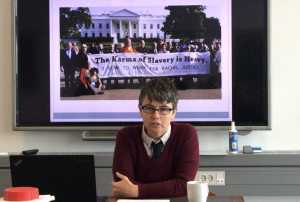
In the Sallekha Sutta, the Discourse on Effacement, translated from Pali by Venerable Nyanaponika Maha Thera, Maha Cunda visits the Buddha, who was staying at Savatthi, in Jeta’s Grove, Anathapindika’s monastery and we may read what the Buddha told him about the arising of wholesome thoughts and the avoidance of unwholesome actions.
The Arising of Thought
Cunda, I say that even the arising of a thought concerned with salutary (skillful) things and ideas (kusala) is of great importance, not to speak of bodily acts and words conforming to such thought. Therefore, Cunda:
The thought should be produced: “Others will be harmful; we shall not be harmful here.”
The thought should be produced: “Others will kill living beings; we shall abstain from killing living beings here.” Etc.
The thought should be produced: “Others will misapprehend according to their individual views, hold on to them tenaciously and not easily discard them; we shall not misapprehend according to individual views nor hold on to them tenaciously, but shall discard them with ease.”
Avoidance
Suppose, Cunda, there were an uneven road and another even road by which to avoid it; and suppose there were an uneven ford and another even ford by which to avoid it.
For the avoiding of harmfulness there is the ready road of harmlessness, walking on which one may easily experience felicity among humans or deities, or one may cross over (by that ford) from this world (to the other shore, Nibbana). The same method of explanation applies to the other sentences. So too:
(1) A person given to harmfulness has non-harming by which to avoid it.
(2) A person given to killing living beings has abstention from killing by which to avoid it.
(3) A person given to taking what is not given has abstention from taking what is not given by which to avoid it.
(4) A person given to unchastity has chastity by which to avoid it.
(5) A person given to false speech has abstention from false speech by which to avoid it.
(6) A person given to malicious speech has abstention from malicious speech by which to avoid it.
(7) A person given to harsh speech has abstention from harsh speech by which to avoid it.
(8) A person given to gossip has abstention from gossip by which to avoid it.
(9) A person given to covetousness has non-covetousness by which to avoid it.
(10) A person given to thoughts of ill will has non-ill will by which to avoid it.
(11) A person given to wrong view has right view by which to avoid it.
(12) A person given to wrong intention has right intention by which to avoid it.
(13) A person given to wrong speech has right speech by which to avoid it
(14) A person given to wrong action has right action by which to avoid it.
(15) A person given to wrong livelihood has right livelihood by which to avoid it.
(16) A person given to wrong effort has right effort by which to avoid it.
(17) A person given to wrong mindfulness has right mindfulness by which to avoid it.
(18) A person given to wrong concentration has right concentration by which to avoid it.
(19) A person given to wrong knowledge has right knowledge by which to avoid it.
(20) A person given to wrong deliverance has right deliverance by which to avoid it.
(21) A person overcome by sloth and torpor has freedom from sloth and torpor by which to avoid it.
(22) A person given to agitation has non-agitation by which to avoid it.
(23) A person given to doubting has freedom from doubt by which to avoid it.
(24) A person given to anger has freedom from anger by which to avoid it.
(25) A person given to hostility has freedom from hostility by which to avoid it.
(26) A person given to denigrating has non-denigrating by which to avoid it.
(27) A person given to domineering has non-domineering by which to avoid it.
(28) A person given to envy has non-envy by which to avoid it.
(29) A person given to jealousy has non-jealousy by which to avoid it.
(30) A person given to fraud has non-fraud by which to avoid it.
(31) A person given to hypocrisy has non-hypocrisy by which to avoid it.
(32) A person given to obstinacy has non-obstinacy by which to avoid it.
(33) A person given to arrogance has non-arrogance by which to avoid it.
(34) A person difficult to admonish has amenability by which to avoid it.
(35) A person given to making bad friends has making good friends by which to avoid it.
(36) A person given to negligence has heedfulness by which to avoid it.
(37) A person given to faithlessness has faith by which to avoid it.
(38) A person given to shamelessness has shame by which to avoid it.
(39) A person without conscience has conscience by which to avoid it.
(40) A person without learning has acquisition of great learning by which to avoid it.
(41) A person given to idleness has energetic endeavor by which to avoid it.
(42) A person without mindfulness has the establishment of mindfulness by which to avoid it.
(43) A person without wisdom has wisdom by which to avoid it.
(44) A person given to misapprehending according to his individual views, to holding on to them tenaciously and not discarding them easily, has non-misapprehension of individual views, non-holding on tenaciously and ease in discarding by which to avoid it.
Thus, by avoiding unskillful choices we avoid the suffering caused by unwholesome actions.
References
Nyanaponika Maha Thera. 1988. The Discourse on Effacement, MN 8, Sallekha Sutta. Wheel 61. Kandy: Buddhist Publication Society.













